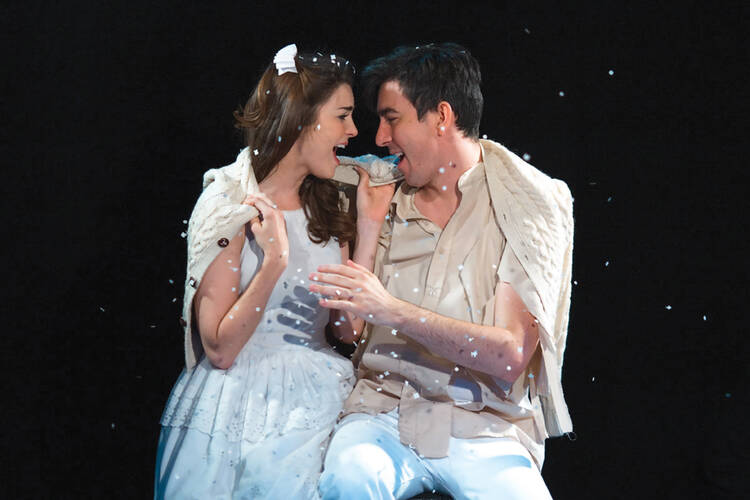In the late 1950s, Broadway and Off Broadway theater had become a bit grim. The major hits of the era presented a rather pessimistic view of life, especially of the family: the home as prison (“A Raisin in the Sun,” “The Miracle Worker”), monster parents (“Gypsy”) and rebellious adolescents (“West Side Story”). Even musicals fell into this pattern. But on May 3, 1960, a modest little musical called The Fantasticks opened Off Broadway at a tiny theater in Greenwich Village. It has become the longest-running musical in the world, still playing at another tiny theater in Times Square.
The simple plot follows the path of two young lovers, whose fathers have pretended to quarrel in order to encourage their children to rebel and fall in love. The story was derived from a 19th-century play by Edmund Rostand, the author of “Cyrano de Bergerac.” The original version of the script was an elaborate musical set on a Texas ranch with the boy and girl living on opposite sides of the Mexican border. But when “West Side Story” opened on Broadway in 1957 exploring similar questions of race and relationship, the playwright and composer were forced to rework the piece. Needless to say, this version had staying power.
Thousands, perhaps millions, of people have seen a production of “The Fantasticks” at least once, either as an Off Broadway production, a regional theater’s staging or a high school or college version. Some may have seen it for the first time as a “Hallmark Hall of Fame” telecast in 1964, starring a real-life El Gallo, Ricardo Montalban.(Am I dating myself here?)
I was fortunate to see the show recently at the Jerry Orbach Theater, named after the famous actor who portrayed the character of El Gallo, the story’s narrator, in the original production. I was pleased to find that the magic of this show has not only survived; it is thriving. Located on the upper end of Times Square, the Jerry Orbach Theater is a more pleasant venue than the Sullivan Street Playhouse, where the show played for its first 47 years. The room is larger, the seating (which is still something less than 100 seats) is roomier and more comfortable, and the stage seems larger.
The current production features Michael Sharon as El Gallo; he bears a striking resemblance to Mr. Orbach and displays an equally powerful voice and allure. The romantic leads are played by two relative newcomers (as is tradition), who are well worth watching. Max Crumm, who won the role of Danny Zuko in a 2007 televised competition for the most recent revival of “Grease,” exhibits a combination of innocence and charm as he plays the romantic young fellow smitten with the girl next door. Samantha Bruce, making her Off-Broadway debut, is a lovely ingénue with impressive singing, dancing and acting skills. I predict she is destined for stardom. The fathers are played by two gentlemen who demonstrate what it means to be theater veterans. In fact one of them, Tom Flagg, was in the original production 55 years ago. He can still capture the mischief, charm and irascibility of the boy’s scheming parent. And there are the lovable but fading old travelling performers, Henry and Mortimer. This production’s Mortimer is performed by Michael Nostrand, who has played the part over 1,000 times on Sullivan Street and is still as clumsy, hammy and loyal as ever.
One of the most refreshing elements of the play still follows the commedia dell’arte tradition of a simple playing area, with the costumes, the few props and even some characters emerging from a large theater trunk set just off-center on the stage. A few witty sound effects add to the magic.
And of course the music remains stellar. Still accompanied only by a piano and a harp, the cast gets to sing some lovely ballads, like “Soon It’s Gonna Rain” and “They Were You”; a couple of charming comic songs sung by the fathers, “Never Say No” and “Plant a Radish”; and the haunting waltz “Try to Remember.” Two of the songs, while archetypal expressions of restless youth, hint at the changes soon to arrive in the 1960s. The boy, dismayed when the joy of early romance turns into the boredom of everyday life, goes off to live a life of adventure and danger. The girl’s cry—“I want much more than keeping house, much more, much more, much more”—expresses what many young women felt at the time (a feeling that was, of course, captured by Betty Friedan).
Although the musical has, for the most part, stood the test of time, the newest production includes a few changes for the better. The song “It Depends on What You Pay” offers a prime example of how a term considered naughty several decades ago became, with more social awareness, offensive and demeaning. The number now replaces the frequent use of the word rape with abduction, which is actually a more accurate description of what they are singing about so gleefully. And in the last spoken line in the play, the creators have changed the sentence, “Leave the wall. Remember, you must always leave the wall”—which always sounded a little too Robert Frost-y to me—with the words, “No, leave the wall. It is not about the wall.” Much better, don’t you think?
There is that line that El Gallo sings in “Try to Remember”: “Without a hurt the heart is hollow.” As the years tumble on, that maxim has come to mean more and more to me. If the enthusiasm for the current production of “The Fantasticks” is any indication, that line, and the story that surrounds it, will resonate with audiences for years to come.








